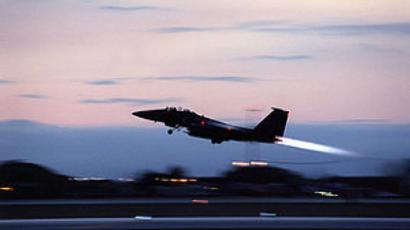ROAR: NATO to cooperate with Russia, conduct maneuvers near its borders

US and NATO officials are continuing to declare their intention to develop relations with Russia, planning at the same time new maneuvers near Russian borders, the media say.
The Western military alliance “will draw a record number of soldiers to Russia’s borders,” Gazeta daily said. NATO is planning to conduct military exercises this year, the paper said, citing the Baltic media. “These maneuvers will be the largest since the three Baltic countries joined the alliance,” the paper said.
“Analysts believe that that the exercises are supposed to calm these countries, who are worried that in case of a military threat, partners from the bloc will not defend them,” the paper said.
Exercises with the participation of 500 US marines may take place in Estonia in June, and Latvia will hold maneuvers later this year, Gazeta said. Baltic officials deny that the exercises are directed against Russia and that they will be a response to maneuvers called Ladoga and Zapad-2009 held by Russia and Belarus last year.
The joint exercises of NATO and Baltic countries may instead be a response to constant reproaches to NATO heard from Baltic capitals, believes Fedor Lukyanov, editor-in-chief of Russia in Global Affairs magazine. Brussels is being blamed “for not making serious commitments to defend the Baltic states,” he told Gazeta.
These countries “simply do not trust the alliance because they suspect that their allies in case of danger will not wish to put relations with Russia at risk,” Lukyanov said. This is confirmed by the fact that the exercises, which will see the deployment of NATO troops in the region, are being held there for the first time, although “Lithuania, Latvia and Estonia joined NATO six years ago,” the analyst stressed.
The discontent of the Baltic countries and some other Eastern European states “undermines NATO’s unity,” Lukyanov said. “To normalize the situation and calm these states, the big countries have decided to hold these maneuvers,” he noted.
Joint military exercises of Baltic countries and NATO should not worry Russia, because the alliance has been conducting this kind of maneuvers since the 1990s even outside the Baltics, believes Ivan Konovalov, military observer for Kommersant daily. The exercises “do not pose any threat to Russia,” he said in a commentary for Actualcomment.ru website.
The maneuvers are more important for the Baltic states, which will be able to demonstrate that they have a strong ally as “they constantly stress their unfriendly attitude to Russia,” Konovalov said. They also want Russia to understand that “they have their own opinion,” he added.
In another sign of NATO’s increasing cooperation with the Baltics, the undersecretary of defense for policy, Michele Flournoy, said on February 26 in Tallinn that Washington does not accept “the assertion of [Russia’s] influence in the region.”
At the same time, Flournoy believes that Russia and NATO still have opportunities for cooperation. This thought was echoed late last week by Alexander Vershbow, assistant secretary of defense for international strategic affairs.
According to him, the decision to stop the cooperation between the alliance and Russia following the August 2008 events in North Caucasus was a mistake that had serious consequences for both parties, Russian media say.
Russia froze its cooperation with the alliance after the accusations from NATO, but several months later, foreign ministries of NATO’s member states declared their intention to resume the cooperation in full format, Vzglyad.ru online newspaper noted. The pause in the relations did not help the alliance, which is more interested in the cooperation than Moscow, the paper said.
NATO and the US want Russia to step up its activities on certain directions of its foreign policy, said Vitaly Tretyakov, editor-in chief of Political Class magazine. The main direction now is Afghanistan, he told Actualcomment.ru.
“The Americans want to pull Russia in Afghanistan as deeply as possible, to the point of Russia’s military presence there,” the analyst said. For the sake of this goal, NATO and US officials might recognize “not only something that was said wrongly in 2008 but even more serious previous faults,” Tretyakov stressed.
“More so because it does not cost anything,” he said, adding that it is in fashion now in the West to recognize mistakes made many years ago.
The problem of former Soviet republics possibly joining NATO may hamper relations between Russia and the alliance, observers believe. Although Ukraine and Georgia will have to meet strict criteria for membership, Vershbow made it clear that NATO will keep the door open for them.
Russia is more skeptical about the partnership with the alliance, expressing its discontent with plans for the bloc’s enlargement, Vzglyad said.
NATO’s “never-ending enlargement” through absorbing countries that used to be part of the Soviet Union “definitely creates certain problems,” President Dmitry Medvedev told Paris Match magazine.
“Analyzing Medvedev’s statements about NATO, observers stress the absence of principal changes in the approach of the Russian leadership to relations with NATO,” Interfax news agency said. At the same time, analysts highlight the two factors that may influence these relations. First is the change of the Ukrainian leadership, and the second is new problems of deploying elements of the US missile defense shield in Eastern Europe, the agency stressed.
Meanwhile, “the US and NATO are continuing to declare their intention to build a partnership of the alliance with Russia,” Vesti.ru website said. “But it is still unclear how they are going to support these words,” it added.
“Vershbow, who once worked the US ambassador to Moscow, did not argue with the opinion that the present structures responsible for the development of this cooperation have not succeeded so far,” the website said.
This was especially clear when the Russia-NATO Council did not act during the events of 2008, Vesti said. But this is just the mechanism that has been initially intended for discussing the most pressing problems, it added.
Sergey Borisov, RT














